I was convinced my baby deserved a better mum
- Published
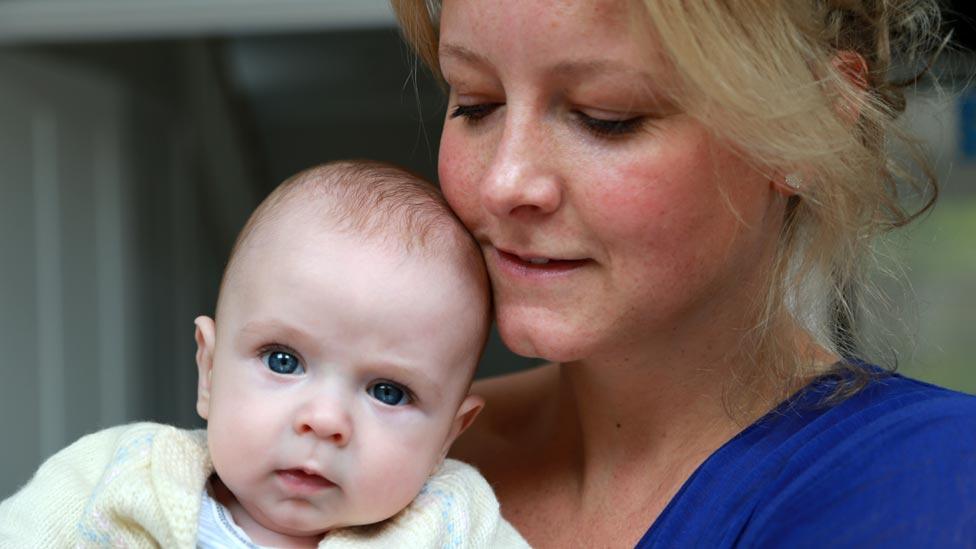
At the end of maternal mental health awareness week, Alexandra Vanotti details her experience of post-natal anxiety and the help she received - which she describes as a godsend.
My sister was on honeymoon in South Africa when my baby boy was born. It was almost a fortnight before she was due home and I had an overwhelming fear that my baby would die before my sister got a chance to meet him. In my mind, over the coming weeks and months my beautiful baby died a thousand deaths. This, despite his clean bill of health.
You may have twigged already that I wasn't well. It took me a bit longer to realise.
I had an uneventful pregnancy, albeit under the care of the high risk team at Chelsea and Westminster hospital in London. At the age of 21, I had undergone heart surgery, but at this stage my heart was fine and it was years since I had seen a cardiologist.
During the first trimester, I was the textbook example of a glowing mother-to-be, full of excitement and wonder at the life growing inside me. But as I approached the 18-week scan, I started feeling anxious. I read a leaflet on the potential health issues that might be picked up at the anomaly scan and I cried tears of terror. But we passed it with no concern. The baby also passed the foetal heart ultrasound - a necessity with my congenital heart problem. And yet I couldn't shake off the sense of foreboding.

As my due date grew nearer, my focus shifted to childbirth and I was bombarded with unwelcome thoughts of sudden heart failure, a twisted umbilical cord around the baby's neck. Stillbirth.
On the surface, though, I was more serene and calm than my family had ever seen. I told nobody of my fears. "Pack your hospital bag," my mother and sister urged, alarmed that with only one month to go, I'd not made one baby purchase. My husband dragged me to choose buggies and cots, rather than the other way round. I was told many times it was wonderful that I was so laid back. My mind, however, was telling me that my baby would die, so what was the point of buying anything?
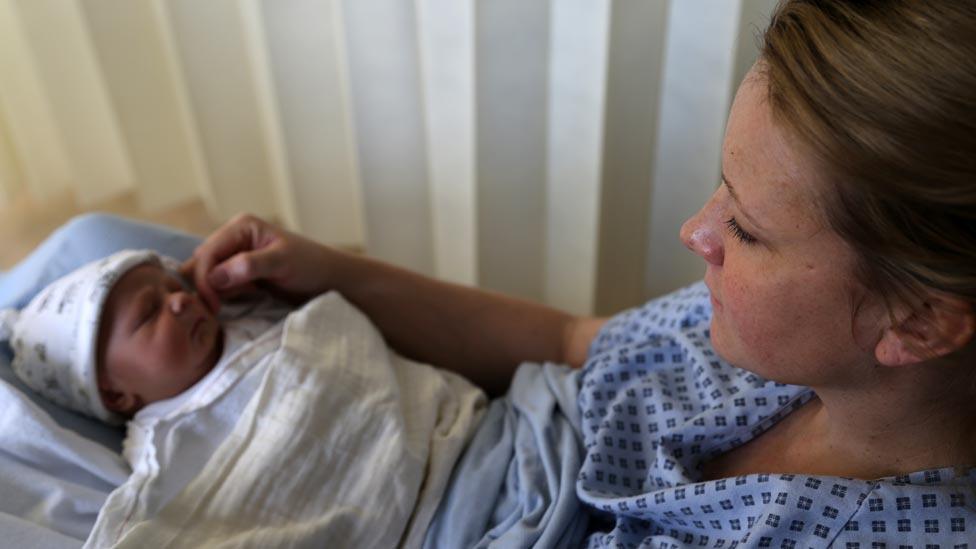
Our baby boy was born on 22 January, 2014. Strangely, despite the pain of contractions, I was calm and cheerful throughout labour. When he arrived I was awestruck, spending 12 hours straight just gazing at him in wonder. He was the most beautiful baby I'd ever seen in my life and I happily told anyone who'd listen. I was completely besotted and blissfully happy. Above all, I was relieved that despite my fears, he and I had survived childbirth together.
It was two days later in hospital that I suddenly felt my stomach clench with fear, as I was hit by a crushing sense of responsibility. How could I keep my baby safe in this big scary world? In my mind, the ways in which he could be harmed were infinite. I would have to be on guard the whole time to make sure nothing happened to him.
My nightmare with postnatal anxiety, OCD and insomnia had begun.
My primary obsession was that my baby would die in his sleep - therefore, I had to stay awake while he slept. To be fair, this is a common concern to new parents. Like many new dads, my husband was also on edge and would hover over the sleeping baby to check he was breathing. But for him, the solution was simple - he bought an under-mattress movement sensor, which would sound an alarm if the baby stopped breathing.
My husband slept soundly after this. I, on the other hand, would just be drifting off, only to jolt awake as I felt the need to check, double check, triple check that I'd turned the sensor on. In my mind, the sensor became the only thing standing between my baby and cot death, so I took it everywhere, even slotting it under the mattress in the pram, switching it on whenever I stopped.
Walking down the high street on one of our first excursions out as a family of three, we were overtaken by a little boy on a scooter, his mother close behind. Instantly a series of intrusive disturbing images flitted through my mind - the scooter veering off the pavement into traffic, the boy hit by a car, a little body lying in the street, the mother screaming hysterically. My legs turned to jelly and I had to hold onto the buggy to stop myself falling. The little boy and his mother continued on their way, oblivious.
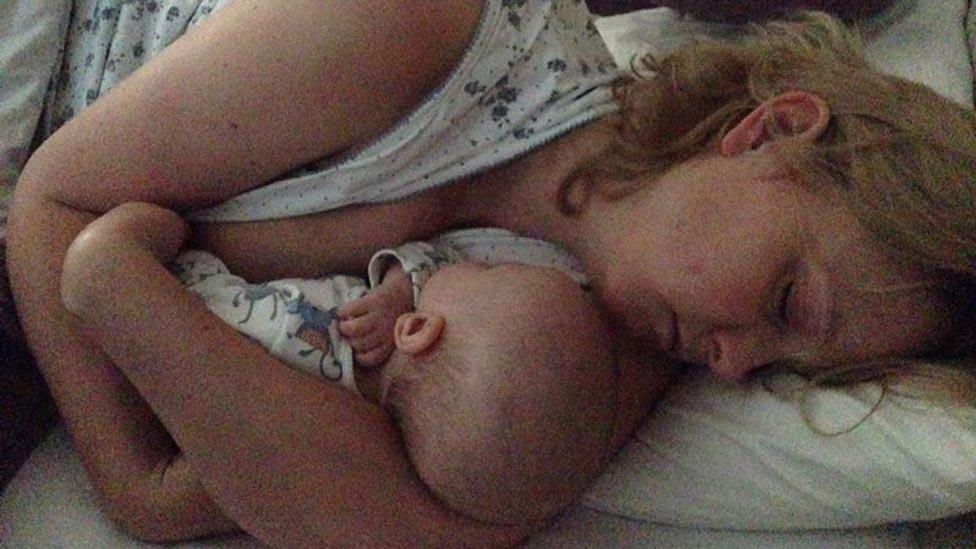
These intrusive images continued, several times a day. Some seemed like reasonable and appropriate fears, such as dropping the baby as I carried him down the stairs, letting go of the buggy and watching it roll into the road in the path of a car. But others were shocking and strange - accidentally putting the baby in the microwave, opening our front door to a stranger who'd fling acid at me and the baby, dropping him off the side of a ferry and watching him disappear into the waves below. Torturous little horror films that ran through my mind all day.
I felt fearful the whole time, full of adrenalin, the way you feel when you've almost tripped while descending a flight of stairs - racing heart, plummeting stomach, jelly legs. I was so preoccupied with my anxious thoughts that I was disconnected from everything else.
When the baby was not even a week old, my husband, alarmed by my mental state, made an emergency doctor's appointment. Initially the doctor talked about baby blues and how I might find myself feeling better in a week or so, but my husband put his foot down and demanded a referral for therapy. On the NHS it would be a four-to-six-week wait. But thanks to our private medical insurance, a week later I was sitting in the waiting room at the Priory in Roehampton waiting for my first psychiatric assessment.

Signs of postnatal depression
a persistent feeling of sadness and low mood
no longer enjoying things you used to enjoy
lack of energy and feeling tired all the time
trouble sleeping at night
feeling you're unable to look after your baby
problems concentrating and making decisions
loss of appetite or an increased appetite (comfort eating)
feeling agitated, irritable or very apathetic (you "can't be bothered")
feelings of guilt, hopelessness and self-blame
difficulty bonding with your baby
frightening thoughts - for example, about hurting your baby; these can be scary, but they're very rarely acted upon
thinking about suicide and self-harm
Source: NHS mental health problems and pregnancy, external
#maternalmentalhealth, #maternalmentalhealthawareness, #askher

The initial assessment involved no therapy, but what seemed like hundreds of questions. The psychiatrist very quickly ascertained that I was suffering from postnatal anxiety and OCD, and that I would benefit from cognitive behavioural therapy (CBT). She explained a sliding scale of anxiety, with most people experiencing it to a certain extent. On her scale I wasn't even near the top, and she reassured me that with therapy I would soon start to feel better. I nodded numbly, wondering just how bad you had to feel to reach the top of the anxiety scale. I felt I was living in my own private hell.
The following week I left the baby with my mother and arrived at the Priory for my first therapy session with a CBT specialist. Cognitive behavioural therapy doesn't involve going back over past issues, instead it looks at current problems and, in particular, it identifies your core beliefs. These are often unrecognised deep-seated beliefs that can affect your life and your behaviour.
In our first session, my therapist quickly identified that I felt utterly crushed by the responsibility of keeping the baby safe. She questioned me gently for almost the whole 90-minute session. Reaching the core belief was like peeling individual layers of an onion, with searching questions that probed deeper and deeper until the fundamental core was revealed.
I broke down in tears and shook with emotion as I finally admitted out loud, "I'm the only person who can keep my baby safe". This was my belief - and I hadn't even known it. Now to work on contesting that belief.

I didn't get better immediately. Not at all. In fact it took nine months of counselling. I found therapy really hard work and didn't look forward to my weekly sessions. I would leave them feeling completely wrung out, emotionally exhausted, and sometimes I couldn't understand why my therapist often went - in my opinion - off on a tangent.
One week she questioned me on my aspirations as a mother and, after listening to me talk about home-cooked food, a clean and tidy house, losing my baby weight, she suggested gently that I stop striving for perfection, and instead aim for "good enough". I looked at her blankly. "What do you mean 'good enough?' Why would I settle for good enough? I want to be the best mum possible," I said. She kept pressing. I kept resisting. I left that session feeling frustrated. In my opinion, good enough meant not enough. And why were we wasting valuable time on this when we should be tackling the "bully in my head" as I had come to call my anxiety? I yearned to be better, back to my old self.
Everywhere I went, I saw danger. It was worse at night. I could almost feel a tangible sense of impending doom. I knew I wouldn't get more than three or four hours' sleep - the baby suffered from silent reflux and woke every 45 minutes after midnight. But even the corners of the room seemed darker and more threatening in the evening.
At night, trying to stop myself falling asleep mid-feed, I found even more horrors on the internet. "The dog ate my baby's head," was one particularly unhelpful headline which had me jumping out of bed at four in the morning, running downstairs to shake my husband awake. "He's going to get mauled by a dog," I cried. He looked at me uncomprehending, bleary eyed, but I couldn't be calmed until he got out of bed and helped me compose an email to my parents and sister about the family cockapoos.
Another news article about baby seats sent shock waves through my core. Babies shouldn't be kept in their car seats for longer than two hours, it said. After reading this, nothing my husband said could convince me to take a car journey longer than half an hour, in case the baby asphyxiated en route.
"I am so anxious," I confided tearfully in my mother. She nodded knowingly and said, "It never goes away, once you're a parent". She didn't realise the extent of my anxiety. I took her words quite literally to mean that I would feel this horrendous for the rest of my life. The bully would never go away. I couldn't possibly survive at that level of anxiety. I thought I had made a mistake, that I was not cut out for motherhood. And then came guilt for not being thankful for my beautiful child.
Ironically I embraced the days when I just felt a dull depression rather than racing anxiety - it was a relief. "This is normal," I told myself. "All mothers feel this and it will pass."
To say I lost myself that first year is no over-exaggeration. I don't recognise my face in photos, my false smile. Delirious and headachy from sleep deprivation, sugar became my crutch and I piled on all the weight I'd lost after giving birth. I didn't get my hair done for more than six months. Putting on a pair of earrings was too much effort. Never mind "good enough", I was failing miserably at being an alpha mum and I knew everyone would be able to see through the camouflage of makeup so it wasn't worth the effort. And I was so very tired, all the time. I hated what was happening to me, and I imagined that my little boy would one day realise he'd drawn the short straw and reject me. I felt he deserved better than me.
The light bulb moment came a few months in, after the "good enough" session. My therapist helped me finally realise that my quest for perfection was fuelling my anxiety. My core belief in this instance? That my self worth was measured by how well I could do things. Before baby, everything from documents at work, to the way my home was decorated, to sourcing a quirky restaurant for dinner with friends, I had put a huge amount of effort into making it as good as possible. I prided myself on being super-organised.
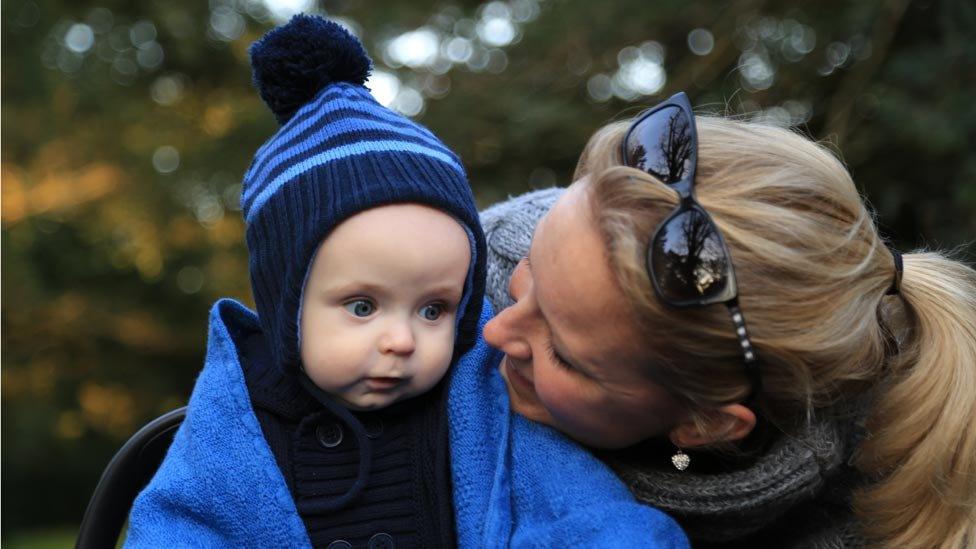
My school friends had a nickname for me - The Guru. I never missed a birthday. I loved doing thoughtful things for my friends and family. My self worth was completely tied up in being this Guru. Naturally I had wanted to be the best mother possible. Before having a baby I had all the time in the world to invest in my pursuit of perfection. But as most new parents discover, you can't control anything about a baby, and it's natural to feel like your life has been turned upside down.
What would happen if I just stopped?
I listened to my therapist and reluctantly decided to give it a go, settling for "good enough" rather than perfection. The world didn't stop turning. The house didn't fall down. I started being kinder and more forgiving of myself. I scrapped my epic "to do" list. I stopped frantically cleaning the kitchen and making the house presentable when the baby napped. Instead, I would curl up next to him and nap too. Or I'd relax with a half-hour treat of daytime TV or trashy magazines ("The trashier the better," my therapist encouraged). I ordered takeaways. I let the dirty washing pile up and ordered myself not to panic about it.
Gradually, life got easier. It felt almost rebellious and sloppy at first, deliberately turning my back on everything I'd strived towards for such a long time. But I soon realised that nobody noticed these changes apart from me. My family and friends didn't love me for the things I did, or how well I did them. They loved me, to quote Bridget Jones, "Just the way you are".

It was deliriously freeing. As I stopped fretting about everything being perfect, I started living in the moment - not dwelling on the past or worrying about the future. Concentrating on one day at a time, I suddenly realised one day that the scary visions and intrusive thoughts were receding.
"You're wearing earrings," exclaimed my therapist one week. I self-consciously touched my ear and smiled. Somehow it hadn't seemed like such an effort this morning.
Like many people, my life has been touched by tragic and traumatic periods, but my first year of motherhood was undoubtedly the toughest time of my life. I think it is safe to say that I was traumatised afterwards. It took a huge toll on my husband, too, watching his wife, his best friend, fall apart before his eyes, turning into someone he didn't recognise.
Three years later, we felt ready to try for our second baby and I was lucky to fall pregnant quickly. I was excited but feared I would fall ill again. The Chelsea and Westminster midwives were really on the ball, though. As soon as I mentioned my previous history during my first check-up, I was referred to the hospital's perinatal service.
I met with psychotherapist Danny once a month or so during my pregnancy. I talked at length about my past experiences and he quickly saw I had convinced myself that the same thing would happen all over again. Danny reassured me that I had a good support network and that we could act swiftly if I fell unwell. I also saw the hospital psychiatrist, who strongly recommended anti-depressants if I started feeling down. My husband, who previously had quite strong opinions on anti-depressants, was in full agreement that this time I should take them if needed.
It started so well. Our baby's birth was calm and without complications. Another beautiful little boy. Bringing him home, I felt our little family was complete, and was elated I'd never have to go through pregnancy again. For the first two weeks I was on a real high - this is what motherhood was meant to feel like. But then he started showing signs of reflux - coughing and spluttering during feeds, hugely disrupted sleep, grimacing in pain. I braced myself for a tough few months but knew that we would survive - after all, we'd done it before with his older brother.
A month after the baby arrived, we lost my elderly father-in-law when he suffered a bad fall. My grieving husband had to organise not just a UK funeral but his father's repatriation to Italy, an enormous task which took up all his time. I developed mastitis. The baby failed his hearing test, showing signs of hearing loss. He wasn't putting on weight (due to his struggles with reflux and breastfeeding). I was diagnosed with a hernia, which needed surgery - and subsequently developed a dangerous infection which required daily visits to hospital. Our troubles seemed never-ending.
I felt massively overwhelmed when left to look after both boys by myself. I literally couldn't put the baby down because of his reflux, which meant that showering, getting dressed, even going to the bathroom was an issue. Getting out of the house with both boys felt like planning a mission to Mars. "Don't you feel utterly panicked when you need to be somewhere at a certain time?" I asked a friend, who was a new mum. "Well," she said, frowning, "It's a mammoth task, of course, but I wouldn't say I panic." I felt self-conscious for over-sharing. I was convinced I couldn't cope. What totally passed me by was that everyone struggles. Looking after babies is hard work, end of story. But for some reason, I felt I needed to have a handle on it - my need for control creeping back in.
Danny came to visit me several times at home and often carried out my therapy sessions while I nursed the baby. There was no way I could have managed the journey to the hospital in those early days.
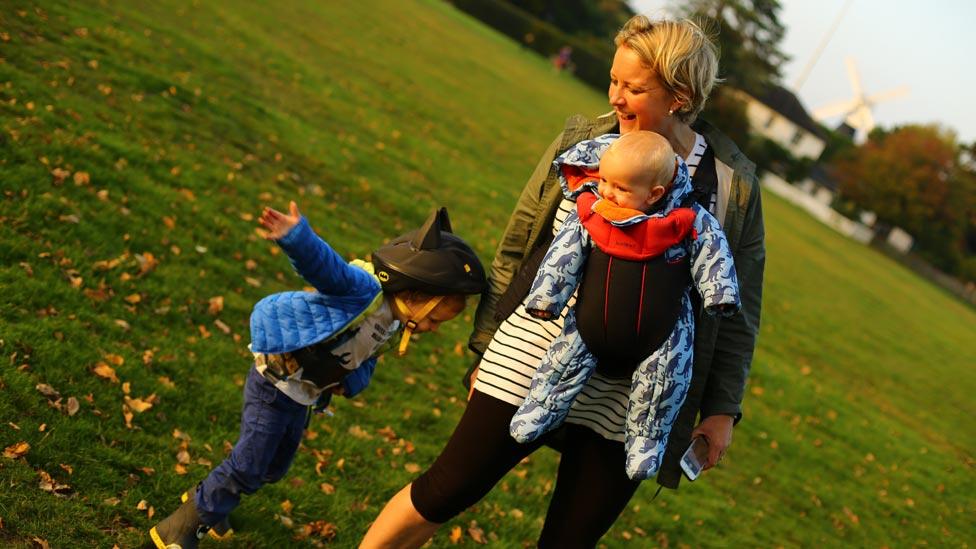
Both my babies suffered from digestive problems and would scream in discomfort for hours at a time, and both times I cut out cows milk from my diet. But I became obsessive over everything that passed my lips, convinced I was slowly poisoning my baby through my breast milk. At one point, I considered a total elimination diet, eating only pear and lamb, until my mother talked me out of it.

One night, staying at my parents' house while my husband was in Italy, I was delirious with exhaustion after two hours trying to settle my miserable screaming baby. I thought about putting the baby down, walking out the front door and stepping in front of a bus. Five minutes later I was tearfully apologising to my son, nuzzling his neck, promising I'd never leave him. I have never had suicidal thoughts and that moment terrified me into action. In the morning I told my mother how I'd felt. And after half an hour of arguing with her - I insisted I could get better by myself - I agreed to start taking anti-depressants. Within a week, I had stopped crying every day - something I hadn't even realised I'd been doing - and the cloud lifted.
A year later, I am still on anti-depressants, and still see Danny and the team from the Chelsea and Westminster perinatal service. They've been a godsend. I feel content with being "good enough". I feel no shame about my struggles. In fact I feel like shouting my story from the rooftops - if only to help other new mothers who feel like I did.
I know how lucky I am but I am concerned for the women who aren't, who don't have someone fighting their corner with the GP, who don't have private medical insurance, who don't live in a postcode that provides such excellent services. In the four years since my first baby, I've noticed a real change in the way people talk about mental health, but I would like to see a real change in the way mothers-to-be are prepared for what might happen, so it doesn't come as such a shock.
And if a new mother even breathes a whisper about feeling down, she should be taken deadly seriously - because this can be deadly. If you feel like I did, you don't have the "baby blues", you are unwell and need medical attention, just as you would for a broken leg or the flu. New mothers are vulnerable enough (both physically and mentally) without having to fight to be heard.
Becoming a mother is life changing in a way that nobody can prepare for, but what we can prepare for is better support for maternal mental health.
Join the conversation - find us on Facebook, external, Instagram, external, YouTube, external and Twitter, external.
